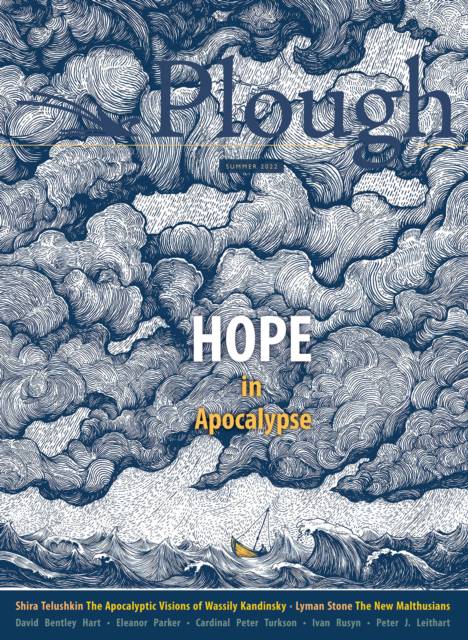
- Retrait gratuit dans votre magasin Club
- 7.000.000 titres dans notre catalogue
- Payer en toute sécurité
- Toujours un magasin près de chez vous
- Retrait gratuit dans votre magasin Club
- 7.000.0000 titres dans notre catalogue
- Payer en toute sécurité
- Toujours un magasin près de chez vous
Plough Quarterly No. 32 - Hope in Apocalypse
David Bentley Hart, Mindy Belz, Peter J Leithart, Shira Telushkin, Joseph Julián González, Peter Turkson, Eleanor Parker, Lyman Stone, Anika T Prather, Brandon McGinley, Joel ClarksonDescription
It's an apocalyptic moment. The grim effects of climate change have left many people in despair. Young people often cite climate fears as a reason they are not having children. Then there's the threat of nuclear war, again in the cards, which could make climate worries a moot point. The paradoxical answer ancient Judaism gave to such despair was a promise: the promise of doomsday, the "Day of the Lord" when God will visit his people and establish lasting justice and peace. Judgment, according to the Hebrew prophets, will be followed by renewal - for the faithful, and perhaps even for the entire cosmos. Over the centuries since, this hopeful vision of apocalypse has carried many others through moments of crisis and catastrophe. Might it do the same for us?
On this theme: creation is transformed and made new.
That's what the "end of the age" meant to Jesus and his early
- Peter J. Leithart says when old worlds die, we need something sturdier than the myth of progress.
- Brandon McGinley says you can't protect your kids from tragedy.
- Cardinal Peter Turkson points to the spiritual roots of the climate crisis.
- David Bentley Hart says disruption, not dogma, is Christianity's grounds for hope.
- Hanna-Barbara Gerl-Falkovitz reminds us that the Book of Revelation ends well.
- Lyman Stone argues that those who claim that having children threatens the environment are wrong.
- Eleanor Parker recounts how, amid Viking terror, one Anglo-Saxon bishop held a kingdom together.
- Shira Telushkin describes how artist Wassily Kandinsky forged a path from the material to the spiritual.
- Anika T. Prather learned to let her children grieve during the pandemic.
Also in the issue:
- Ukrainian pastor Ivan Rusyn describes ministering in wartime Bucha and Kyiv.
- Mindy Belz reports on farmers who held out in Syria despite ISIS.
- New poems by winners of the 2022 Rhina Espaillat Poetry Award
- A profile of newly sainted Charles de Foucauld
- Reviews of Elena Ferrante's In the Margins, Abigail Favale's The Genesis of Gender, and Emily St. John Mandel's Sea of Tranquility
- Readers' forum, comics, and more
Plough Quarterly features stories, ideas, and culture for people eager to apply their faith to the challenges we face. Each issue includes in-depth articles, interviews, poetry, book reviews, and art.
Spécifications
Parties prenantes
- Auteur(s) :
- Editeur:
Contenu
- Nombre de pages :
- 120
- Langue:
- Anglais
- Collection :
Caractéristiques
- EAN:
- 9781636080550
- Date de parution :
- 31-05-22
- Format:
- Livre broché
- Format numérique:
- Trade paperback (VS)
- Dimensions :
- 186 mm x 258 mm
- Poids :
- 340 g

Les avis
Nous publions uniquement les avis qui respectent les conditions requises. Consultez nos conditions pour les avis.






